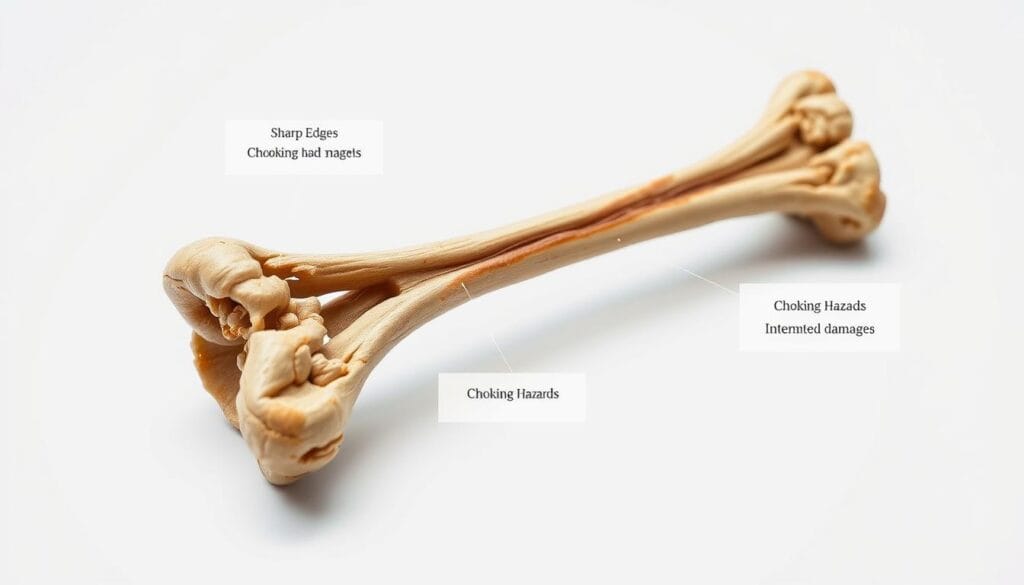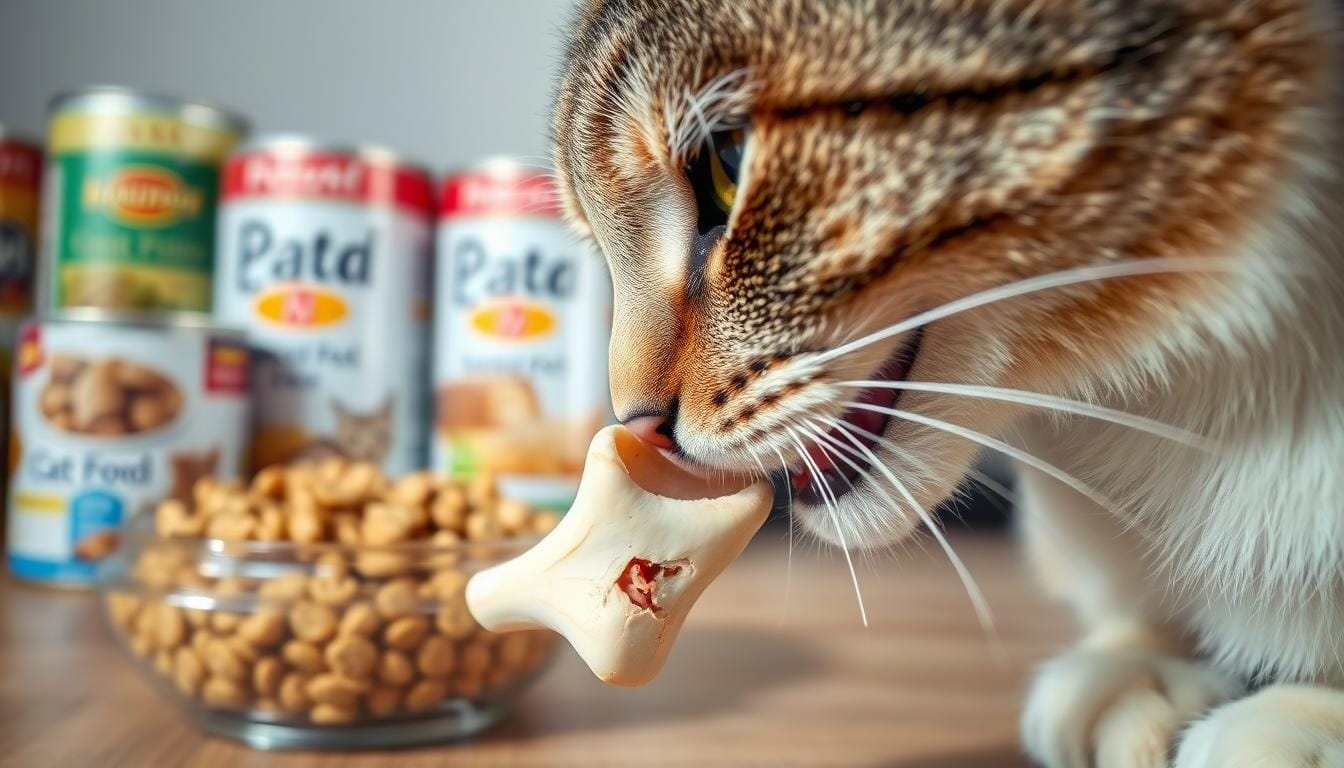Can Cats Eat Bones Safely? Raw vs Cooked Bones Explained
Table of Contents
can cats eat bones ?
As a devoted cat parent, I vividly remember the first time my curious feline companion pounced on a leftover chicken bone. Panic set in as I wondered: can cats eat bones safely? This moment sparked my deep dive into understanding the complex world of feline nutrition.
Cats have a fascinating evolutionary history with bones. Their wild ancestors consumed entire prey, including bones, which provided essential nutrients and dental benefits. Today’s domesticated cats retain many of these instinctive dietary preferences, making the question of bone consumption both intriguing and important for pet owners.
Understanding whether cats can eat bones requires careful examination. Whether you’re dealing with raw or cooked bones, the safety considerations are critical. Some bones can provide nutritional advantages, while others pose significant health risks to your furry friend.
In this comprehensive guide, we’ll explore the complex relationship between cats and bones. You’ll discover the nuanced details about can cats eat bones and the specific precautions needed when considering chicken bones or other bone types in your cat’s diet.
Join me as we unravel the mysteries of feline nutrition and learn how to make informed decisions about your cat’s dietary needs.
Understanding Cats’ Dietary Needs
Cats are special animals with specific dietary needs. They are meat-eaters, unlike many other pets. Knowing what cats should eat, like chicken bones, is key to keeping them healthy.
In the wild, cats hunt and eat small animals. Their diet shows us what they need to eat:
- Mice and small rodents
- Birds
- Insects
- Small reptiles
What Do Cats Naturally Eat?
Wild cats eat whole animals, including meat, organs, and bones. This diet is what domestic cats need too. When thinking about chicken bones for cats, it’s important to know their natural diet.
| Nutritional Component | Importance for Cats |
|---|---|
| Protein | Primary energy source, essential for muscle maintenance |
| Taurine | Critical for heart and eye health |
| Animal-based Nutrients | Cannot be synthesized from plant sources |
Importance of Protein in Their Diet
Protein is vital for cats. Unlike humans or omnivorous pets, cats need a lot more protein. Their bodies are made to use animal proteins well, making meat diets essential for their health.
When thinking about chicken bones or other bones, remember cats should eat like they do in the wild. Always talk to a vet to make sure you’re feeding your cat right.
Are Bones Safe for Cats to Eat?
When your cat ate chicken bone, it’s crucial to understand the potential risks and safety concerns. Bones can be a complex dietary addition for felines, presenting both benefits and significant dangers.

Feeding bones to cats requires careful consideration. While some veterinarians suggest raw bones can provide nutritional advantages, the risks often outweigh potential benefits.
Potential Risks of Feeding Bones to Cats
- Choking hazards
- Intestinal blockage
- Tooth fractures
- Internal punctures
- Bacterial infections
Critical Warning Signs After Bone Consumption
If your cat ate chicken bone, watch for these warning indicators that suggest potential medical complications:
| Symptom | Potential Concern |
|---|---|
| Excessive drooling | Possible throat obstruction |
| Vomiting | Digestive tract irritation |
| Lethargy | Potential internal injury |
| Difficulty swallowing | Throat or esophageal damage |
Immediate veterinary consultation is recommended if you notice any of these symptoms after your cat consumed bones.
Professional veterinarians typically advise against feeding bones to cats due to the substantial health risks. Your cat’s safety should always be the primary concern when considering dietary modifications.
Raw Bones vs. Cooked Bones: What’s the Difference?
Understanding the difference between raw and cooked bones is key to keeping your cat safe. Not all bones are safe for cats, and how they’re prepared matters a lot.
Looking into cats eating chicken bones shows us some important facts. Raw bones have benefits, but cooked bones are risky.
Nutritional Benefits of Raw Bones
Raw bones offer great benefits for your cat’s health:
- They’re a natural source of calcium and minerals.
- They help keep teeth clean by removing plaque.
- Chewing on them keeps your cat’s mind active.
- They help your cat act like it’s hunting.
Dangers of Cooked Bones
Cooked chicken bones are very dangerous for cats. The cooking makes them:
- Brittle and more likely to splinter.
- They can cause choking.
- They might hurt your cat’s insides.
- They could block your cat’s digestive tract.
Always think about your cat’s safety when considering chicken bones. Raw bones can be a treat, but they need to be chosen carefully and watched closely.
It’s very important to talk to a vet before adding new foods to your cat’s diet.
Types of Bones That Are Safe for Cats
Feeding bones to cats needs careful thought. Some raw bones are good, but not all are safe. Knowing which bones are okay can help avoid health problems.

When picking bones for cats, size and type are key. Small, soft bones are usually the safest for your cat.
Appropriate Raw Bones for Cats
Raw bones can be good for cats if chosen right. Here are some good options:
- Chicken wing tips
- Quail bones
- Small rabbit bones
- Soft raw turkey necks
These bones are small enough for cats to eat safely. Make sure they are raw and meaty, fitting your cat’s size and chewing skills.
Which Bones to Avoid
Not all bones are good for cats. Stay away from:
- Large weight-bearing bones
- Cooked bones of any kind
- Beef or pork bones
- Bones from larger animals
Remember, raw chicken bones from wing tips or small pieces are safer than big or cooked bones. Always watch your cat and talk to your vet before adding new foods.
How to Prepare Bones for Your Cat
Adding bones to your cat’s diet needs careful steps and thought. If you’re wondering if cats should eat chicken bones, knowing how to handle and serve them is key. This ensures your pet stays safe and gets the nutrients they need.
Before giving bones to your cat, follow important guidelines to avoid risks. It’s all about being cautious and informed when feeding bones to your cat.
Cleaning and Handling Bones Safely
Preparing bones for your cat involves several important steps:
- Wash raw bones well with clean water
- Take off any fat or connective tissue
- Choose fresh, high-quality bones from reliable sources
- Always watch your cat while they eat bones
Portion Size Recommendations
When thinking about if cats should eat chicken bones, size is crucial. Bigger bones are safer for cats.
| Cat Size | Recommended Bone Size | Frequency |
|---|---|---|
| Small Cat (Under 8 lbs) | Chicken neck or wing tip | 1-2 times per week |
| Medium Cat (8-12 lbs) | Small chicken wing | 2-3 times per week |
| Large Cat (Over 12 lbs) | Chicken wing or small chicken back | 3-4 times per week |
Pro tip: Always choose raw bones that are larger than your cat’s mouth to prevent choking hazards.
Remember, each cat is different when it comes to bones. Start with small amounts and watch for any bad reactions. If unsure, talk to your vet about whether your cat should eat chicken bones.
Alternatives to Bones for Dental Health
Keeping your cat’s teeth clean doesn’t mean you have to give them bones. While some cats can eat bones, safer and easier options exist. These alternatives help keep their teeth in top shape.
Dental care for cats is more than just bones. Vets suggest several safe and effective ways to keep their teeth clean. These methods avoid the dangers of bones.
Specialized Chewing Products
Today, there are many dental solutions for cats:
- Dental chew treats that clean teeth
- Rubber chew toys that clean gums and remove plaque
- Textured dental strips that fight tartar
Safe Treats for Healthy Teeth
Choosing the right treats is key for your cat’s dental health. Look for treats that:
- Help clean teeth naturally
- Have dental-friendly ingredients
- Are vet-approved
Pro tip: Dental biscuits and special cat foods can also help with dental health while being nutritious.
Don’t forget regular dental check-ups. Talk to your vet to create a dental care plan that fits your cat’s needs.
Consulting Your Veterinarian
Caring for your cat’s health is more than just watching what they eat. Bones and dietary risks need professional advice. If your cat ate a chicken bone or seems upset, a vet’s help is key.
When to Seek Professional Advice
Your vet should be your first call in several situations:
- If your cat has accidentally consumed a bone
- When you notice unusual eating behaviors
- If your pet displays signs of choking or discomfort
- Before introducing new dietary elements like bones
Regular Check-ups for Bone Health
Routine vet visits are crucial for your cat’s health. During these, vets can:
- Assess your cat’s dental condition
- Check for potential bone-related issues
- Provide personalized dietary recommendations
- Detect early signs of digestive problems
Remember, prevention is always better than cure when it comes to your feline friend’s health.
Conclusion: Making Informed Decisions
When looking into cats eating chicken bones, it’s important to think carefully. Each cat has different needs, and knowing the risks and benefits of bones is key. You should do your research and get advice from experts.
Raw bones can help with dental health and provide natural nutrients if chosen right. Small, meaty bones from chicken might be good for your cat. But, not all bones are safe, and watching your cat closely is crucial to avoid problems.
Your vet is the best person to talk to about your cat’s diet. Every cat is different, so what’s good for one might not be for another. A diet that’s just right for your cat is more important than adding bones to their food.
Prioritizing Feline Nutrition
Your main goal is to keep your pet healthy. While bones can be part of their diet, they shouldn’t replace good cat food or expert advice. Always put your cat’s safety and health first, not just for fun.
- Can cats eat chicken and what are the health benefits?
- Can cats have chicken as a protein source? Comprehensive guide
- Can Cats Eat Raw Chicken? Safety Guide for Cat Owners
- Dry Cat Food Brands Loved by Cats and Trusted by Vets
- Best Cat Food for Sensitive Stomach:Top 5 Vet-Approved Picks
- Special Kitty Kitten Food – Learn the Pros and Cons
- prescription cat food-Top 10 Prescription Cat Foods
- Wet Cat Food for Kittens: Top Nutritious Choices 2025
- How Long Can Wet Cat Food Sit Out? Critical Facts
- American Veterinary Medical Association (AVMA)

